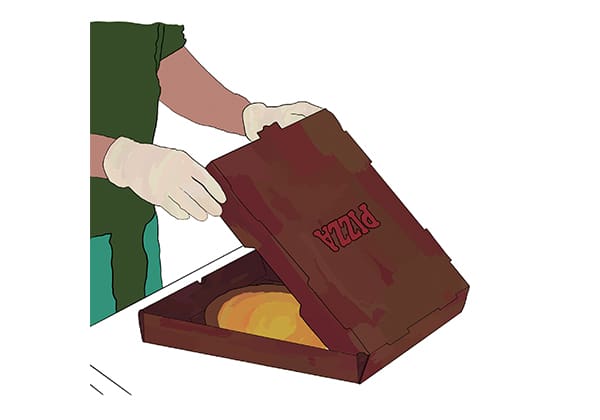Every shift at work, I have a routine I follow during my lunch break. I walk a predetermined route and stop by all the local haunts, greeting those inside and picking up all the same meals. When I walk through the doors, the person behind the counter gives me a warm smile, and I follow suit. More recently, we’ve had to rely on the crinkling of our eyes or the raising of eyebrows to signal a hello, but it is an acknowledgment of the other’s presence nonetheless. After the usual pleasantries — “Hi, how’s it going?” — but before I even begin to order, they already know what I want: “Crispy Pork Banh Mi?” “Toasted Ham and Cheese Croissant?” “King Prawn Nigiri?” Or sometimes they even just say: “The usual?”
Thus is the life of a “regular,” and there’s something comforting about the relationship between me and the person behind the counter. It is a fleeting ephemeral one. We both know why I am there, and we can talk as much or as little as we want. There’s a feeling of safety in this repetition, of getting “the usual.” And sometimes, after visiting enough, you get benefits: mates rates, discounts, a free drink. I am rewarded with my loyalty, that I chose this place out of any other to return to.
On the other side of the counter, you feel similar joys. There’s a feeling of pride in remembering people’s names or orders, and catching up with how they’re doing in life. When I worked at Pizza Hut, I made sure to try and remember all the names of our regular customers. I would ask them how they’re going, and often give them free food for their continual return. I can still recall the names and orders of some of our most frequent customers.
Adam:
Double Pizza Meal
1x Deep Pan Super Supreme Pizza
1x Traditional Pepperoni Pizza
1x Garlic Bread
1x 1.25L Bottle of Pepsi
John:
1x Medium Cheese Lovers Pizza
1x Can of 7Up
Sara:
2x Large Thin Cheese Lovers Pizzas
1x Cheesy Garlic Bread
All three customers would come in or dial up everyday for the two years I worked there. It became so frequent that I knew if they were calling by just seeing their phone numbers. It got so bad I would complete their sentences, even doing so when they read out their card number — needless to say, I noticed that their debit card had changed the next time they ordered.
In many ways, the life of the regular has been simultaneously strengthened and strangled by the recent lockdown. Forced to go for walks within a 5km radius of our homes has meant not only the discovery of local cafes and restaurants you might never have been to before, but more importantly the strengthening of the relationship with the businesses you frequent the most. What might have been an occasional trip to your local corner store or cafe, has now become a desperate lifeline in your daily activities. The frantic trip up the road for a coffee has become the saving grace for families and couples, soothing boiled up tensions and making the grind of work that much easier while locked indoors. At the same time, businesses you might have gone to more frequently pre-lockdown might have lost their revenue stream and have closed up for good. While you have lost connections with some businesses forever, new relationships have blossomed with ones closer to home.
All these relationships are transactional in nature. We come and go for a particular product. When an employee gives out freebies, it is rewarding the customer for their loyalty to a particular brand. But why would we do this? We don’t owe anyone anything. Most of the money will be going to the boss. We have no reason to reward these people or, as a customer, to be rewarded.
In giving out freebies and discounts to regulars we are collectively acknowledging our struggle under capitalism. The person serving us is almost never the boss, nor are the people coming in every day. When we had mothers struggling to put food on their table, we gave them extra food or slashed their prices. When a man slept in his car just outside our shop, we brought him a free box of pizza everyday so he had something to eat. The stock price for these foods is ridiculously low, and so I knew that the corporate oligarch of Pizza Hut could spare a few cents to help those in need. In giving out free food, providing discounts, and forging friendships across the counter, we are creating a kinship between humans, making life just a little easier, and reminding us that we’re all in this together.





